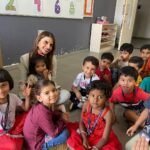Each experience we encounter in life becomes a story when we share it, whether in the moment or flashback childhood stories…we all have a story to share.
Whether we use our own stories, creatively making up stories or read aloud from books, stories are the most powerful tool for education. Read aloud help young children build early literacy and language skills by promoting rich vocabulary words, correct context of words in a sentence, knowledge of the world, comprehension skills, reading fluency, voice intonation, emotions and creativity, an experience of pure communication skills. While children want to hear stories, ‘what’ we read to them is the big picture… “The concept”.
A story has the power to be what you want it to be. Parents can pick just about any book, but for the best results, do read the book through once, then think of – “what concepts can you take out from this one little book?”.
What are concepts?
Concepts are the bigger picture we want to address or can address.
Even though we read aloud to bond with our children, let us not forget that through this simple read aloud we can address these big ideas. Big ideas or concepts can be social emotional issues, math, language, social studies, history, geography, science concepts, growth mindset and even global issuesaround the world! Imagine this one book you pick can turn into a mini inquiry of a concept or topic. Use it to provoke curiosity about a topic you wish to inquire into, then the story becomes a medium to enhance research skills and thinking skills. How can stories be used as a success tool depends on how we use them. Stories promote understanding of different cultures, bringing in thinking about each other’s perspectives, respect, compassion, tolerance and then becomes meaningful as they make connections to self and the world around them, in turn this promotes social skills. Some simple examples of the use of books for an all-round experience is the story of The Cat in the Hat by Dr.Suess. I had used this book with my children and emphasized on the point of balance that the cat displayed while standing on one leg with all the objects he was holding. This provoked the curiosity of the concept “gravity”, and became my mini-inquiry for the children.
The story brought in comprehension in fun ways with identification of rhyming words throughout along with creativity when we thought about how the Cat in the Hat invented his own cleaning machine. Story extensions is another key rule to follow, as these hands-on experiences bring in play with materials for children to demonstrate their comprehension and to apply their understanding of the concepts. Post this story, we did math and engineering extensions with measuring how tall we can build a tower using cups to balance which allowed them to apply their understanding of gravity to make learning meaningful.
Another story which covered social-emotional issues, self-management skills as well as develops growth mindset is “Giraffes can’t dance”. Through this story children begin to believe in themselves and identify issues to work on, setting goals for themselves. The story “Lorax” by Dr.Suess is a story that engaged the children and they made connections with global issues and current affairs such as the Australian fire and deforestation.
Summing it up, read aloud every day but do allow the children to show their favorite part of the story and identifying the area of interest for your child. Allow them to play and construct the meaning of the world through play and giving them the knowledge to dig deeper in their play. I have attached a list of book titles that are must-reads for children that address many concepts. Make it beautiful, make it meaningful and as creative as you can.
Here’s the list of books that I have used and recommend:
1 Where the Wild Things Are by Maurice Sendak
2 The True Story of the Three Little Pigs by A.Wolf, By Jon Scieszka
3 Corduroy by Don Freeman
4 Is Your Mama a Llama? by Deborah Guarino
5 Owen by Kevin Henkes
6 Miss Bindergarten Gets Ready for Kindergarten by Joseph Slate
7 Harold and the Purple Crayon by Crockett Johnson
8 Don’t Let the Pigeon Drive the Bus by Mo Willems
9 Runaway Bunny by Margaret Wise Brown
10 Whistle for Willie by Ezra Jack Keats
11 Brown Bear, Brown Bear, What Do You See? by Bill Martin, Jr. and Eric Carle
12 Love You Forever by Robert Munsch
13 Kitten’s First Full Moon by Kevin Henkes
14 Are You My Mother? By P.D. Eastman
15 Good Night, Gorilla by Peggy Rathmann
16 In the Tall, Tall Grass by Denise Fleming
17 Dear Zoo by Rod Campbell
18 Gossie by Olivier Dunrea
19 Close Your Eyes by Kate Banks
20 The Very Hungry Caterpillar by Eric Carle
21 The Cat in the Hat by Dr. Seuss
22 The Ugly Duckling by Hans Christian Andersen
23 Goodnight Moon, By Margaret Wise Brown
24 The Dot by Peter H. Reynolds
25 Duck! Rabbit! by Amy Krouse Rosenthal
26 Pete the Cat: I Love My White Shoes by Eric Litwin
27 The Paper Bag Princess by Robert Munsch,
28 Where the Sidewalk Ends* by Shel Silverstein
29 The Giving Tree by Shel Silverstein
30 Perfect Square by Michael Hall
31 Whoever You Are
32 If You Give a Mouse a Cookie by Laura Joffe Numeroff
33 Little Blue and Little Yellow by Leo Lionni
34 Pink is for Boys by Robb Pearlman
35 Mouse Paint by Ellen Stoll Walsh
36 Elmer by David McKee
37 It’s Okay to be Different by Todd Parr
38 No! David by David Shannon
39 I Ain’t Gonna Paint No More! by Karen Beaumont
40 My truck is stuck! by Kevin Lewis
41 The Most Magnificent Thing by Ashley Spires
42 Wonder by R. J. Palacio
43 The Girl Who Never Made Mistakes by Mark Pett and Gary Rubinstein
44 I Am Peace: A Book of Mindfulness by Susan Verde and Peter Reynolds
45 Giraffes can’t dance by G. Andrea and G. Parker-Rees
46 Beautiful Oops! by Barney Saltzberg
47 Thanks for the feedback, I think (Best me I can be) by Julia Cook
48 What do you do with an Idea? by Kobi Yamada
49 What do you do with a problem? by Kobi Yamada
50 How to catch a star by Oliver Jeffers
51 Stick and Stone by Beth Ferry
52 Ish by Peter Reynolds
53 Sky Color by Peter Reynolds
54 I am Human! A book of Empathy by Peter Reynolds
55 The day the crayons quit by Peter Reynolds
56 A sick day for Amos McGee by Philip C. Stead and Erin E. Stead
57 Chrysanthemum by Kevin Henkes
58 Click, Clack, Moo: Cows That Type by Doreen Cronin
59 What if everybody did that? By Ellen Javernick
60 Not a box by Antoinette Portis
-
Fatema Agarkar, Founder and Chairperson , Agarkar Centre of Excellence (ACE)
Veteran of 3 educational start-ups , now Founder of the Agarkar Centre of Excellence, Fatema’s passion for teaching-learning and children defines the different roles she has crafted in 20 years – as an edupreneur, educator and mentor.
Fatema who is a State and University topper as part of the prestigious Mumbai based Sydenham College of Commerce & Economics, holds a degree of Masters in Business Administration (MBA) from Birmingham (UK), apart from her B.ED and ECCE degrees amassed when she decided education was her calling. Having kick-started her career in the corporate world and working with premier organizations like Commerzbank, Times of India and Egon Zehnder International, she always had an inner urge to bring about an enhancement in the sphere of education..
As an educationist and life-long learner, she has come a long way to intertwine modern methods of learning, teaching and customizing education as per the student’s intellectual requisites thus eradicating stress that stems from the education system. She has been sedulous in making comprehensive alterations in the education field in India. Being a risk-taker, Fatema has been focusing on the generation of innovative educational modules and her in-depth academic know-how, nothing but truly defines her ceaseless passion. Her name is synonymous with successful education models of the country and she is adjudged as Education World’s top 50 Educators in the year 2020. Adding more feathers to her hat, she has also been the recipient of several prestigious awards for her outstanding contribution to the field of education in the years 2013 and 2015.
Fatema has been awarded by Giants Group for her outstanding contribution to the field of education in 2012, the Young Achiever’s Award in the year 2017, Singapore based, Best of Asia’s, ‘Enterprising Educator in the year 2018 and as an entrepreneur ‘Best Edupreneur 2019 and Best Leadership’ by Progressive Academic Excellence India (Maharashtra 2019) and one of the 10th finest inspirational educators in 2019 by TKR, India . Her name is synonymous with successful education models of the country and she is adjudged as Education World’s top 50 Educators in the year 2020. Adding more feathers to her hat With close to 2 decades of experience in education, Fatema is the recipient of several honours including the Indian Achiever’s Award 2021. In July 2023, Fatema was also awarded the ‘Mumbai’s top Women Leader’ award by the CMO Asia National Awards’ (10th edition). Fatema is also a Jury Member for Cambridge School Recognition Awards 2025.
Having being associated with leading high school brands like DRS International, Hyderabad, NSS Hill Spring International, Mumbai, The Gera School, Goa, D Y Patil High School, Talegaon (Pune), SVM, Ratnagiri by the Gadre family, The Excellere World School, Gurgaon, JBCN International Schools, Mumbai, Fatema has now close to 40 pre-schools and high schools that she has set up from the grassroot level including a school for special needs’.
Fatema is on the Advisory Board of several Trusts including EduTech India, Wockhardft Foundation as well as a jury member, Education World Awards, a platform that recognizes the efforts of educators pan India. Fatema is also the Vice President for Early Childhood Association (ECA) and the Mumbai Territory Head for Association for Primary Education & Research (APER) in India. Fatema has been appointed as the global ambassador of the Commonwealth Entrepreneurs Club. . Fatema is on the advisory board of the All-India Gaming Federation (AIGF) and currently appointed as the National Council Member for Financial Literacy & Management by WICCI. Given her access to parents and her ability to provide age appropriate strategies to enable them to make more informed choices, Fatema’s passion remains counselling in the hope that effective parenting will enable children to benefit the most.
Fatema is also the special advisor of the Child Chapter Association (CCA), a non-governmental organisation registered as a Section 8. company under the Companies Act, 2013 whose mission is to spread awareness and eliminate child abuse, including child sexual abuse. Her role as a special advisor of CCA includes providing advice and guidance for their special outreach programs for Schools and teachers that tap into the child psyche and help them raise their voice against abuse. Fatema also played an instrumental role in the development of the CCA comic books and characters for their global campaign for child abuse awareness and prevention.
Currently, Fatema is the Advisor & Mentor to Finland International School, Race Course and on course to start her own school in 2026. As a TedX speaker, and a avid blogger, Fatema is passionate about sharing her knowledge amassed and inspiring stakeholders be it teachers, parents or students.
Her vision includes set up up of Soup Kitchens, Foster Homes and a community centre for the elderly under the Agarkar Foundation in time.
View all posts












